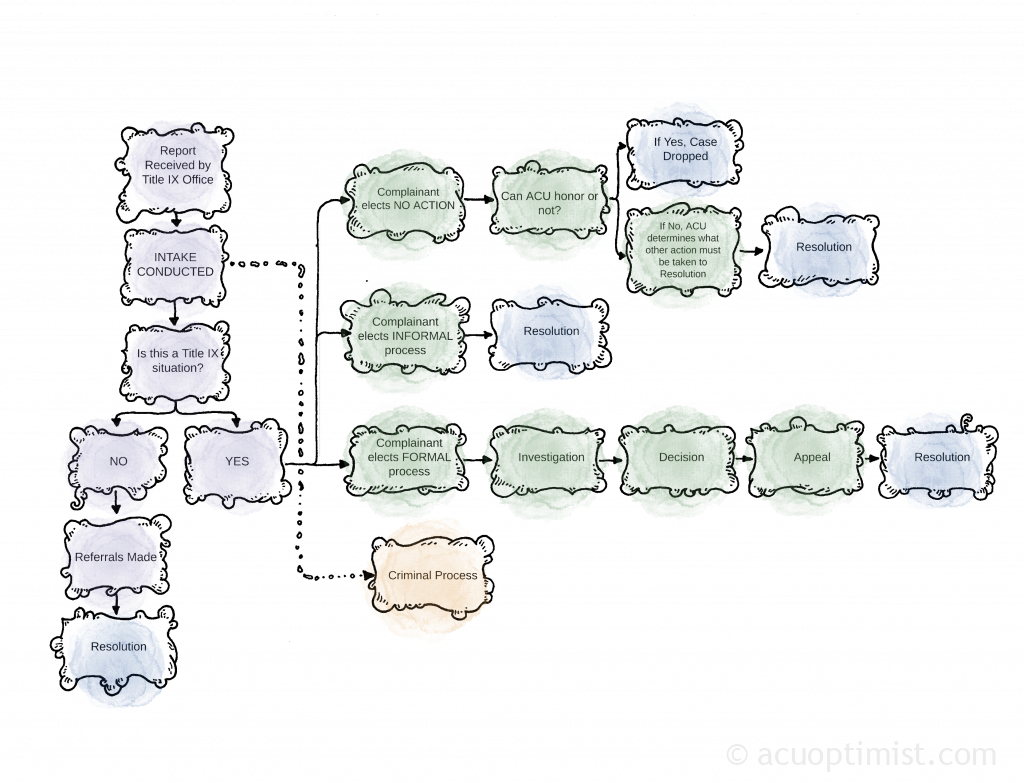Title IX is more than a joke. It is a conversation.
Across colleges in America, a Title IX office is present to support students through any sexual and/or dating violence experiences.
Campus apps like Yik Yak and Fizz flow with jokes about reporting someone for Title IX, but the office’s work is a conversation far beyond the laugh.
Title IX’s original purpose was seen through athletic programs. They ensured that male and female teams received the same treatment. It was the “Dear Colleague Letter” that gave the office more responsibilities to include advocacy for students experiencing dating and sexual violence along with pregnancy protection.
At ACU, Title IX stays an ensured reminder to all students through annual meetings and on-campus campaigns such as Denim Day and “What I Wore.”
When talking about an awkward topic like sex, it is common to use jokes as a way to cope. It can be argued the fact that people are joking about it actually helps spread awareness and keep people informed the office exists, but is it also keeping students away from it.
Wendy Jones, Title IX co-coordinator, said she does not mind the jokes if it is helping others.
“To joke, you have to know it exists,” Jones said. “I wish students didn’t joke about it, but if it keeps a conversation going, then maybe I’m not mad about it.”
October is Domestic Violence Awareness Month and college-aged students are the most prone to being involved in an intimate violent incident, according to the Bureau of Justice. With those odds, students need to understand the work Title IX does to provide comfort through traumatic experiences and how to identify them.
Jones said most of the confusion about intimate violence starts with the definition of a simple word, consent.
“Today’s definition is different than previous generations, or things like alcohol can change it,” Jones said.
In today’s society, it is challenging to decipher when you are experiencing or have experienced a violent incident. That is why Title IX is present. Keeping students informed on the simple black-and-white scale, when it seems like a grey area is present, starts the healing process. Charts are available on the website to help simplify a perceived complicated situation.
Students have an abundance of support and resources within the office that are available to them. From counseling to no-contact orders, it is free of charge. The office can rearrange schedules and living arrangements and assist in outside processes like filing a police report or visiting a hospital to get treatment.
To receive support from the Title IX Office, students can report through an online form, talk to a faculty member or simply walk into a coordinator’s office during typical office hours. As a concerned friend, you can also submit a form on the website or be present as emotional support through the process.
Because Texas has a mandatory reporters rule, anything confided to a professor, RA or faculty, except the Chaplin and counseling center faculty, is subject to be reported if is it determined you are at risk of harm to yourself or others.
Based on the incident and what the victim wants, support services will be offered, but the help can only start after the conversation is had.
Keeping the conversation going is most important; by not shying away from an uncomfortable topic, you open yourself to standing against intimate violence and being a safe space for those who have experienced it.
So, push past the joke, start the conversation and change how we handle bad intimacy.

